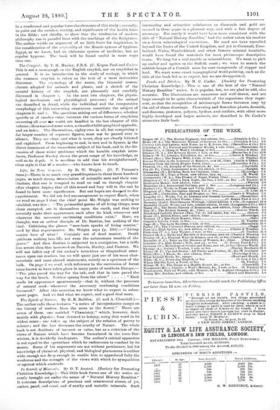Life, its True trt , nesis. By Rs W. Wright. (G. P.
Putnam's Sons.)—There is so much easy grandiloquence in these three hundred pages, so mach strong denunciation of scientific men and their con- clusions, that one is tempted to read on and on through chapter after chapter, hoping that all this sound and fury will in the end be found to have some significance. But our hopes are doomed to dis- appointment. We did not feel encouragement to expect !Such, when we read on page 1 that the chief point Mr. Wright was seeking to establish was this :- -" The primordial germs of all living things, man alone excepted, are in themselves upon the earth, and that they severally make their appearance, each after its kind, whenever and wherever the necessary euvironing conditions exist." Here, we thought, was an ardent disciple of Dr. Bastian, but nothing of the kind. Criticising the phrase "new-born specks of living matter," used by that experimenter, Mr. Wright says (p. 190) :—" Living
matter born of what Certainly not of dead matter. Death quickens nothing into life, not even the autonomous moulds of the grave." And then Bastian is subjected to a castigation, but a tzifle less severe than that bestowed on Darwin, Huxley, and Pasteur. We will not inflict any of the author's invectives or rhapsodical utter- ances upon our readers. but we will quote just one of his most char- acteristic and most absurd statements, merely as a specimen of the bulk. On page 2 we read, with reference to the succession of forest trees known to have taken place in many parts of northern Europe,— " The pine paved the way for the oak, and that in turn paved the way for the beech. Neither sprang from the other." "Each made its appearance spontaneously—that is, without the presence of natural seed--whenever the necessary environing conditions favoured." After this assertion we know what to expect in subse- quent pages. And we find what we expect, and a good deal more.






























 Previous page
Previous page